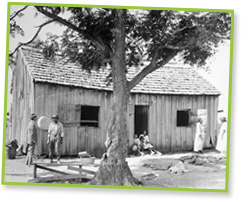A Bronzeville Story
Elementary: Grades 3–4
Story
Page: 1 | 2 | 3 | 4 | 5 | 6 | 7 | 8 | 9 | 10
A Bronzeville Story
"All right, everybody, here we are," Uncle Obie said. There was a note of pride in his voice. "South Parkway, just off 35th Street. That puts us right in the heart of Bronzeville. You're going to like Chicago, I believe."
Penny looked out at Uncle Obie's house as the car pulled up to the curb. She could see why he seemed so proud. The house was three stories high and built from giant blocks of yellowish stone. It had wide front steps and a nice roomy porch with a wrought-iron railing. The street was even lined with shade trees.
It was 1949, and Penny was eleven years old. But she had rarely laid eyes on a house so fine. Back home in Mississippi, she'd only known white folks to live in such places. Even there, though, she hadn't seen many. Going into those neighborhoods might bring a body a lot of trouble, even if you had business there.
But that whole life in Mississippi was long gone now. For Penny, her parents, and her brother, Cleet, home had been a tiny, two-room wood cabin. It stood off a dirt road outside Clarksdale. From now on, though, Clarksdale would be only a memory. They had traded it for life in this big city. They were part of something her parents called the Great Migration.
Penny hadn't known what those words meant, but now she knew well. The first wave of that migration had started about 1916, just as America was about to get involved in World War I.
Daddy had explained it all on the train north, while Penny had watched her old world disappear, and a new one start to unfold outside the window.
"Once the war broke out, plenty of men went off to fight," he told her. "That left all those jobs open up there, you understand? Thousands of folks migrated north to the big cities like Chicago, Detroit, New York, all those places. All hoping to get some of the good-paying work those soldiers left behind."
Downloads (pdf)

